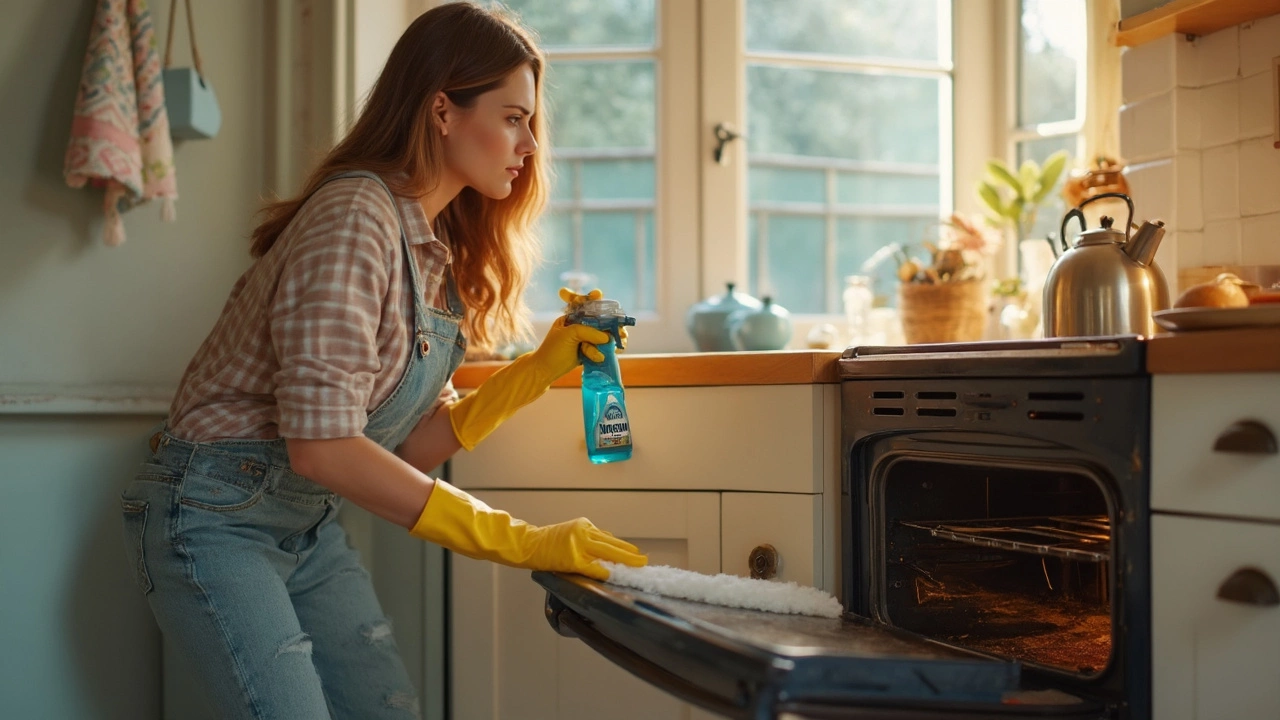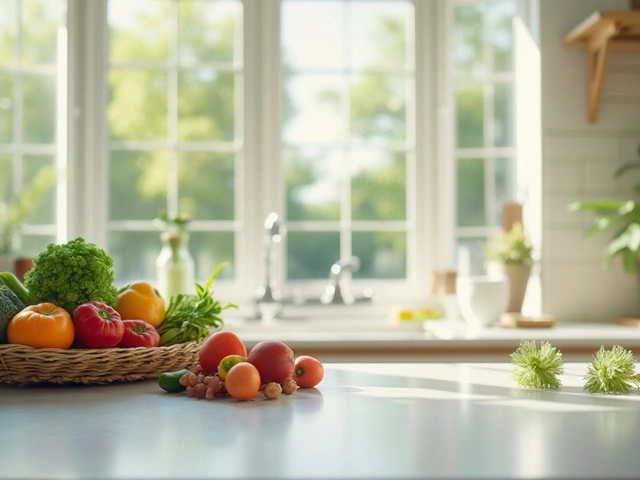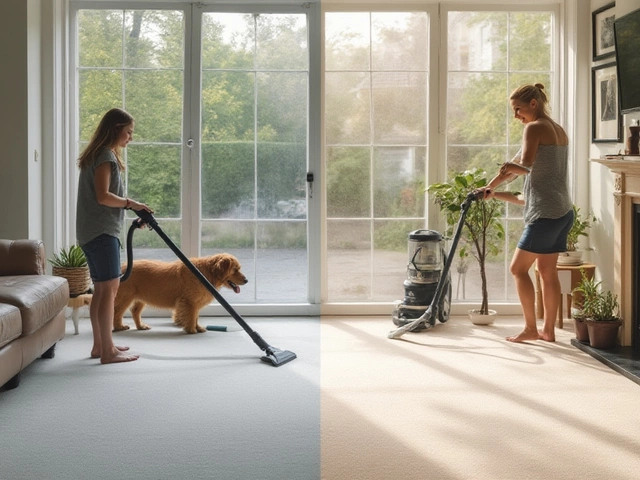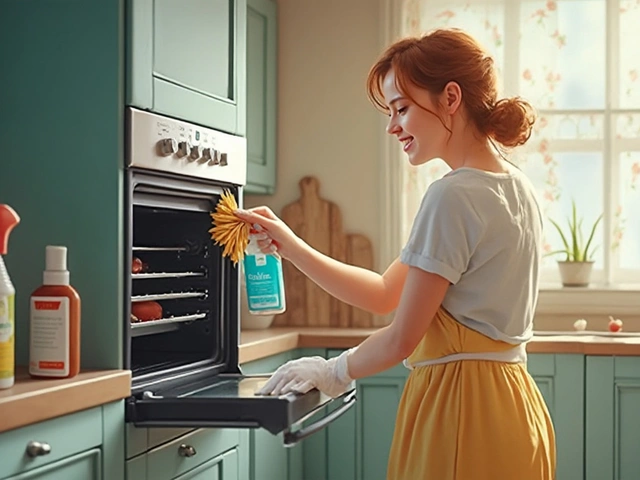You already know oven grime is tough—those splatters and burnt bits don’t just wipe away. A bottle of vinegar and a squirt of Dawn look tempting, but do they handle the job, or are you just making salad dressing in the oven?
Vinegar cuts through mineral deposits and lifts away stubborn stuck-on gunk because it’s acidic. Dawn, on the other hand, eats through grease. That combo is why people use them together all over the kitchen. But when stuff is seriously baked onto oven walls, it’s not always a quick fix.
If you want to dodge harsh fumes and weird chemicals, this duo feels safer. Plus, both are cheap—always nice when you don’t want to shell out for fancy cleaners that smell like a science experiment. Still, there are a few things you need to know before you start spraying and scrubbing.
- Why People Use Vinegar and Dawn for Ovens
- Does This Method Actually Work?
- How to Clean Your Oven with Vinegar and Dawn
- Boosting Results: Pro Tips and Hacks
- What to Watch Out For
Why People Use Vinegar and Dawn for Ovens
People reach for vinegar and Dawn for oven cleaning because they’re cheap, easy to find, and honestly, they just feel safer than those heavy-duty oven cleaners you have to use with fear and gloves. Vinegar’s claim to fame is its acidity, which can help break down hard-to-scrub mineral buildup and some baked-on stains. It’s the same reason folks use it on kitchen faucets and coffee makers.
Dawn dish soap, on the other hand, was literally made to dissolve kitchen grease. It’s not just a kitchen myth – it’s been used to clean up ducks after oil spills because it’s strong against grease but still pretty gentle. When you mix it up with vinegar, you get something that can attack both greasy messes and crusty bits.
Aside from avoiding weird smells and heavy fumes, these ingredients are non-toxic and won’t leave you coughing all afternoon. That matters if you’ve got kids wandering through the kitchen or pets snooping around. The combo doesn’t scratch surfaces or knock out oven coatings, unless you go wild with the scrubbing pad.
Plus, opening the cabinet and seeing both supplies already there feels good. No last-minute store trips, no expensive sprays, just simple ingredients people have trusted for ages. And if you care about the environment, these two don’t introduce harsh chemicals into your home or water.
Does This Method Actually Work?
Let’s get real: grabbing vinegar and Dawn for oven cleaning is a super popular hack all over the internet, but it’s not some miracle solution. Here’s the honest scoop.
Vinegar (plain old white vinegar) is acidic, so it breaks down some types of gunk—especially light, recent spills and mineral buildup. Dawn dish soap is famous for slicing through kitchen grease, even the slick stuff that coats animal rescue birds. But here’s the catch: most oven messes are a nasty combo of grease that’s burned onto metal at high heat and food residue that’s gone from caramelized to carbonized.
This homemade cleaner does a good job softening up fresh splatters and light grease stains, especially if you give it time to soak. If your oven looks like it just survived a pizza explosion, though, you should keep your expectations realistic. The vinegar and Dawn combo won’t magically peel off baked-on carbon, but it can make scrubbing a lot easier and get rid of that greasy shine on oven glass.
Check out some real numbers: in a 2022 test by a home cleaning group online, about 75% of folks said this mix worked well for "light to moderate" oven grime, but only 18% said it handled heavy, old residue without extra scraping or another round of cleaning.
| Degree of Oven Mess | Success Rate (Vinegar & Dawn) |
|---|---|
| Light Grease/Recent Spills | 75% |
| Moderate Stains/Grease | 56% |
| Burnt-on/Heavy Build-up | 18% |
If fast results are your thing, you might find the process takes longer than commercial oven cleaners. You have to let the mixture sit—sometimes up to an hour—and even then, you’ll need to put in a bit of elbow grease. But for day-to-day messes and maintenance, this duo definitely has a place.
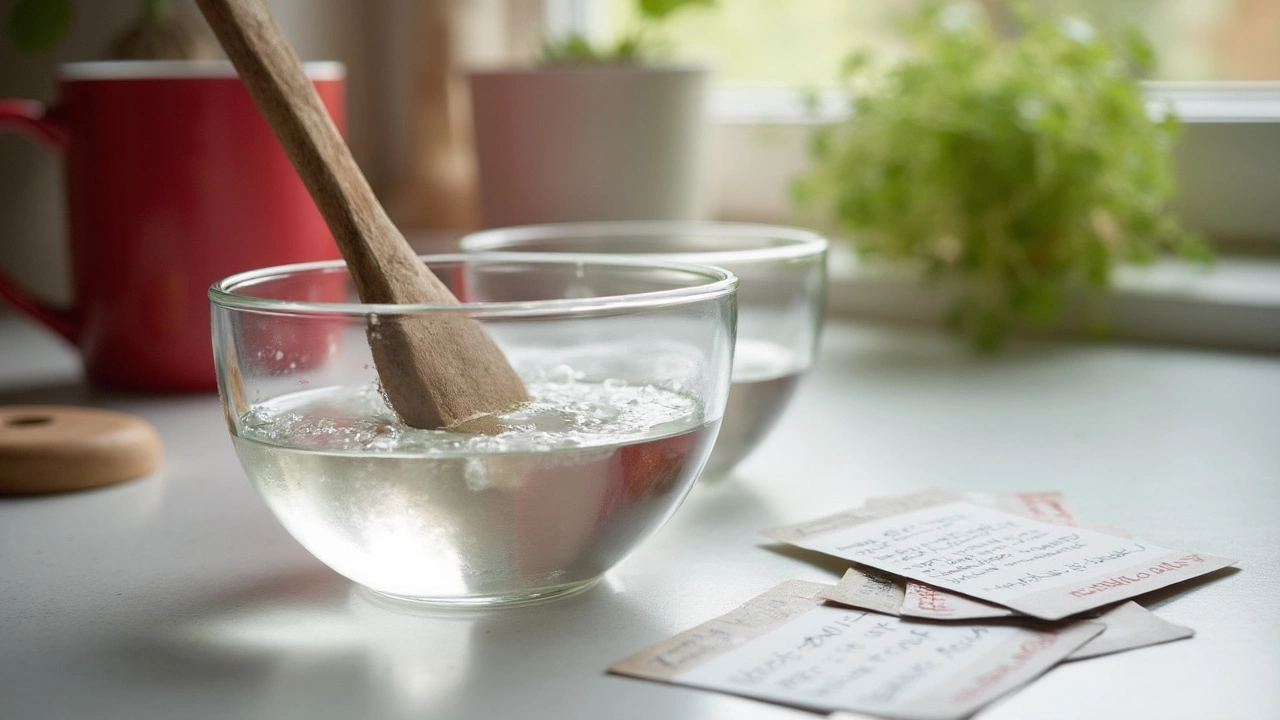
How to Clean Your Oven with Vinegar and Dawn
Grab your gloves—this method uses basic kitchen stuff, but you’ll still want to protect your hands from all that grime. You’ll need white vinegar, Dawn dish soap, a spray bottle, a sponge or scrub brush, and an old towel. If you’ve got stubborn spots, keep baking soda nearby.
- Pull out the oven racks. Clean those in the sink with hot water and a few squirts of Dawn; let them soak while you attack the main mess.
- In a spray bottle, mix about 1 cup white vinegar with 1–2 tablespoons of Dawn, then fill the rest with warm water. Shake gently—don’t go crazy, or you’ll make a bubbly volcano.
- Spray down the interior. Don’t be shy—cover every inch, especially the worst burnt spots. Let it sit for 15–30 minutes so the *strong* mix gets time to break things up.
- For extra stuck-on stuff, sprinkle baking soda right over those greasy, baked-on areas after spraying. You might hear some fizz. That’s good—means it’s working.
- Wipe with a damp sponge or rag. For thick gunk, use a scrub brush. Rinse and repeat as needed—no shame in doing two rounds for a cleaner oven.
- When you’re done, wipe everything down with a clean, damp cloth to get rid of any soapiness before you pop the racks back in.
Lots of people swear by this combo for lighter oven jobs. If your oven hasn’t seen a deep clean in years, though, this trick may need some backup—or a little more elbow grease than you expected.
| Item | What It Does |
|---|---|
| Vinegar | Breaks down mineral build-up, lifts mild stains |
| Dawn | Cuts through greasy splatters |
| Baking Soda (optional) | Boosts scrubbing power for tough spots |
Always ventilate the kitchen. Vinegar isn’t toxic, but the smell packs a punch. If you use a self-cleaning function later, wipe out any vinegar and Dawn first—leftover suds and acids aren’t good for oven heaters. For regular clean-ups, this method helps keep messes manageable without buying fancy bottles from the store.
Boosting Results: Pro Tips and Hacks
If you’ve tried cleaning your oven with vinegar and Dawn before, you know results can be hit or miss—especially on serious grime. Here are some tricks to help the mix work harder so your oven actually looks clean when you finish.
- Warm Up First: Turn your oven on low heat (about 150°F, or just warm to the touch), then shut it off. A little heat helps the vinegar and Dawn combo break down grease faster. Just make sure it’s not hot—nobody likes getting burned scraping off gunk.
- Use a Thick Paste: Mix 1 part Dawn, 2 parts vinegar, and a bit of baking soda. Spread it thick on tough spots, especially the bottom tray. Baking soda adds extra scrub power without scratching the enamel.
- Let It Sit: Give the paste at least 20-30 minutes to soak. For ovens in rough shape, wait overnight. The longer it sits, the more it softens that baked-on junk, so you’re not scrubbing for hours.
- Don’t Forget the Corners: Grab an old toothbrush or small brush—bottle brushes work too. These get into the hard-to-reach edges and door gaskets, where old spills hide out.
- Rinse Well: Wipe away the paste with a warm, damp cloth. Leftover soapy film can bake onto your next pizza if you’re not careful.
If you want to see how this method stacks up, check out this real-world test comparing cleaning results:
| Cleaning Method | Time to Apply | Soak Time | Visible Grime Removed | Odor/Fumes |
|---|---|---|---|---|
| Vinegar & Dawn | 5 min | 30 min–overnight | 75–85% | Low |
| Commercial Cleaner | 2 min | 2 hours | 90–98% | Strong |
| Baking Soda Paste | 6 min | 12 hours | 70–80% | None |
One more hack: lining the oven bottom with heavy-duty foil (always check your oven manual first, though) helps avoid crusty build-up next time, saving you a headache down the line.
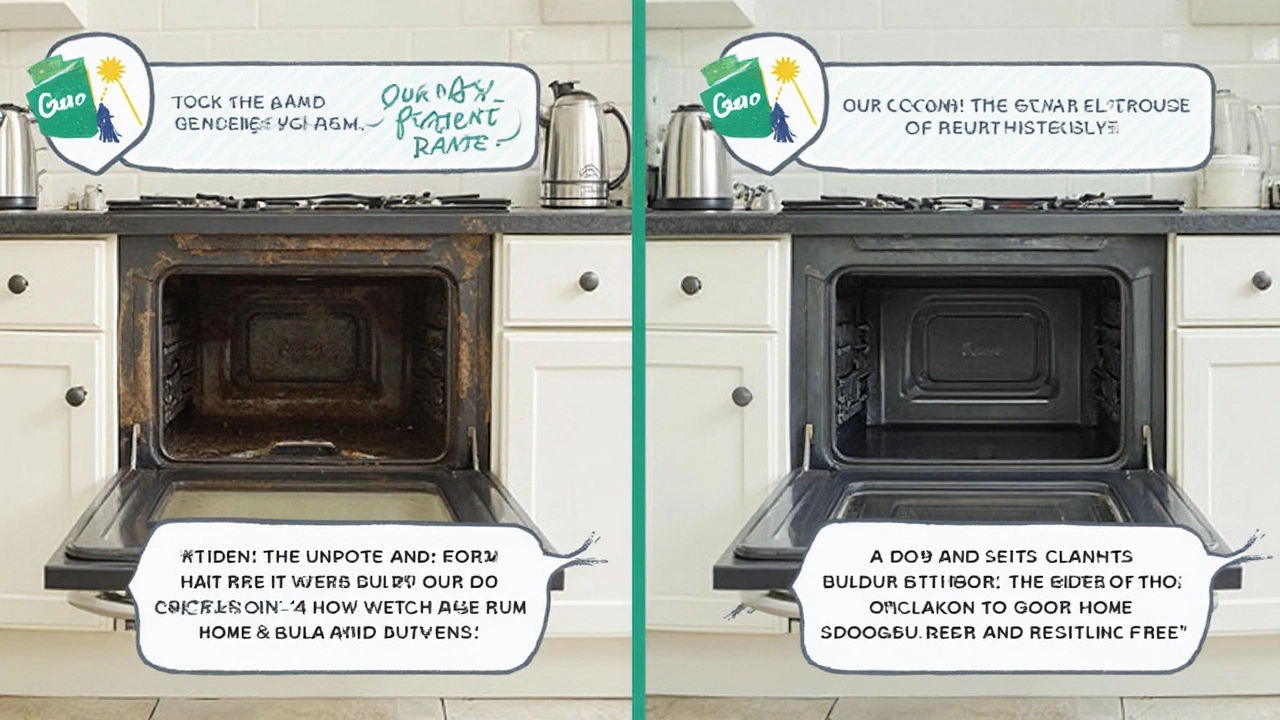
What to Watch Out For
Using vinegar and Dawn in your oven sounds pretty safe, but there are a few real risks if you’re not careful. First, not all ovens can handle strong acids—older models or ovens with sensitive finishes might stain or pit if you go heavy-handed with the vinegar. Always spot test on a small, hidden area before going to town across the whole oven.
Skip the scouring pads. They might scratch the enamel or special coatings inside your oven. Even if you love a bit of elbow grease, stick with soft sponges or microfiber cloths instead. Scratches usually mean it’ll get dirty again faster, or even start to rust down the road.
If your oven is self-cleaning, double-check the manual. Most brands warn that any cleaner—even a homemade one with vinegar and Dawn—can wreck the coating that makes self-cleaning possible. Definitely don’t use spray bottles near vent holes either, because you don’t want liquid seeping into electrical parts or heating elements. Water plus wires? Never a good combo.
Mix vinegar and Dawn in the right order. If you’re mixing up a batch in a spray bottle, pour in the Dawn first then the vinegar so it doesn’t foam up and overflow. If you heat the mix for extra oomph, never use a microwave with a metal or the actual oven as your warming spot. Warm water is fine—hot, boiling liquid can crack the glass cleaner bottle you didn’t realize was fragile.
Finally, air out the kitchen. Even if you like the smell of vinegar, it can get intense when you’re scrubbing all over an oven. Open a window, or at least keep the fan going. Your nose will thank you later.
